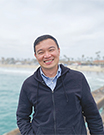From Worshiping Guanyin to Faith in Christ


I always believed that religion was a personal decision—one could believe in anything that brought them peace. Worshiping Guanyin had given me a smooth life and a successful career, leaving no reason to reconsider my faith. However, I thank God, because through my parents’ conversion to Christianity before their passing, I was guided toward the Christian faith through the Bible. Over time, I not only gained a clear understanding of salvation, but I also became determined to dedicate the second half of my life to pursuing things with eternal value.
Around the same time, my second eldest brother also returned to Hong Kong, while my eldest brother moved to Japan, leaving only my aging parents in Canada. Holding onto my promise to care for them, I returned to Canada after five years and applied for my wife’s immigration so we could build our family together.
My family had always practiced traditional folk beliefs, and since childhood, I followed my parents in worshiping Guanyin. This devotion stemmed from an unforgettable childhood experience—when my mother was suspected of having a malignant tumor in her neck, our family was gripped with fear. She taught me to recite the Guanyin Sutra, and I devoutly chanted it multiple times a day. Miraculously, her condition improved, and she was eventually diagnosed as cancer-free.
From that moment, I firmly believed in Guanyin’s blessings and continued to recite scriptures and pray every night. Looking back now, I realize that my faith carried a sense of 'exchange'—using scripture recitation, incense offerings, or donations in return for peace and protection. This way of practicing faith remained deeply rooted in my heart for many years.

I saw religion as a personal choice, one that I had never thought I would reconsider. Worshiping Guanyin had brought me good fortune—my career thrived, I bought a house upon returning to Canada, and I was promoted with a salary increase. There seemed to be no reason to change my beliefs.
Yet beneath the surface, I was under immense pressure. My workplace was highly competitive, my work hours were excessively long, and office politics were relentless. At home, communication with my wife was strained—we argued frequently, and I grew impatient with our children. Distance grew between us, creating a tense family atmosphere. But instead of confronting these problems, I convinced myself that “every family has its struggles” and outwardly pretended everything was fine.
Everything shifted when my father was diagnosed with liver cancer and passed away within a short time. In his final days, my wife shared the gospel with him, and he accepted Jesus. At the time, I avoided discussing faith—I simply thought, if this belief brought him comfort, let him follow his heart.
Soon after, my mother was diagnosed with lymphoma. Though her condition initially stabilized, it later relapsed. Nina repeatedly tried to share the gospel with her, but my mother firmly resisted, stating that she would never betray her faith. Ignorantly, I even told Nina, “If my mother were to end up in hell for not believing in Jesus, I should go with her so I can take care of her!”
Then, one day, after undergoing radiation therapy, my mother slept for an entire day. When she woke up, she unexpectedly said, “Guanyin does not have enough power—it cannot even protect itself.”
Her words shocked me—she had devoted her life to worshiping Guanyin. Why would she suddenly say this? This happened multiple times, and I even rebuked her: "Why have you lost faith in Guanyin? She has blessed you for decades, and now you show her disrespect?"
Despite everything, my mother remained steadfast, declaring, “I am loyal to my faith and will not betray it.” Fearing that pressing further might hurt their relationship, Nina stopped bringing it up—but she continued to pray silently.

The author and his family
It turned out that a few weeks before accepting Christ, she had suffered a severe gastric hemorrhage and was in critical condition. But she miraculously recovered, allowing her to live long enough to hear the gospel. A few days later, her health declined rapidly—she could no longer speak or move. Yet one night, a fellow patient told us, “Last night, your mother was very happy, as if she were celebrating.”
The next day, I saw her holding a cup that had been placed far away from her reach. These experiences made me start wondering—was there truly a supernatural force quietly at work?After my mother passed away, a question lingered in my heart: My parents both believed in Jesus and would reunite in heaven one day—but what about me? If I did not believe in Jesus, wouldn’t that mean I would never see them again?
This thought led me to open the Bible, hoping to understand their faith. I downloaded a Bible app and started listening while driving, beginning with the Five Books of Moses. But after listening, I was filled with doubts:
Isn’t it said that “God is love”? Then why couldn’t I feel it?
Instead, all I heard was judgment and destruction. When I came across the story of God destroying Sodom and Gomorrah—even sparing no children—I wrestled with frustration and uncertainty.
"How could a loving God allow such destruction?" I wondered. "Is such a God truly worthy of belief?"
Later, I started attending worship services with my wife, though I hadn’t yet made the decision to accept Christ. Stepping into church no longer made me feel uncomfortable or restless. The pastor’s sermons answered the questions in my heart, and even the hymns sounded more beautiful than before. Everything seemed to change quietly, without my even realizing it.
Then, one morning in April 2016, I asked my wife, “Why didn’t the pastor invite people to accept Christ after the sermon?” She looked at me in surprise and asked, “Are you ready to believe in Jesus? You don’t need a pastor to make that decision—it can be done at home too.”
That very day, at home and with my wife by my side, I made the decision to accept Christ. At that moment, we embraced, moved to tears—tears of joy and gratitude. I have never been someone who cries easily, but I believe this was the work of the Holy Spirit. From that day forward, my apprehension in church disappeared, and my heart was completely transformed by God.

Later, I began serving in the church’s children’s ministry and was invited to become a small group leader—a role I held for five years. Now, I serve in the BSF leadership team and occasionally lead Bible studies in fellowship groups. One of the greatest lessons I have learned is that when we take a step forward in faith, God leads the way.
My wife’s commitment to God also deepened through BSF, and she dedicated herself to both BSF and the children’s ministry at church, while I focused on adult ministries. We share a common vision—to spread God’s love to people of all ages, wherever we are. Last summer, we participated in our first short-term mission trip to Brazil, and through that experience, we strongly felt that the vision God placed in our hearts was being fulfilled.
Now, both of our daughters have grown up, and our elder daughter has been baptized into Christ. We thank God that she serves as a counselor at a youth camp, while our younger daughter actively participates in fellowship. I am still working, but I plan to retire within two years and pursue theological studies to equip myself for further service.
Last March, I developed an eye condition with inflammation and severe pain, requiring long-term medication. Now, early symptoms of cataracts have also appeared. These experiences have made me more aware of life’s fragility. In the past, I worked tirelessly for my family and career, but now, I know that it is time to dedicate the second half of my life to God and invest in something with eternal value. Johnny Leung
Johnny Leung





